Turkey-Syria earthquake: first aid convoy reaches Syria as ...
The death toll in Turkey from Monday’s earthquakes has risen to 14,014, the Turkish president, Recep Tayyip Erdoğan, has said, with more than 63,000 people injured.
Visiting the quake-hit province of Gaziantep, Erdoğan said more than 6,400 buildings had been destroyed and that Turkey aimed to build new three and four-storey buildings in the region within one year, Reuters reports.
A total of at least 3,162 are confirmed dead in Syria, with government-held areas reporting 1,262 people dead and 1,900 killed in the rebel-controlled northwest, meaning the combined tally in both countries now stands at 17, 176.
Experts have said that it is likely to continue to rise.
Key events
Show key events only
Please turn on JavaScript to use this feature
News that the first UN aid convoy has crossed the border from Turkey into northwest Syria is promising, but far more will be needed in a region that was in dire humanitarian need before Monday’s earthquake struck.
While up to two more crossings may open if security stays good, the UN has has described the Bab al-Hawa border crossing as a lifeline for accessing the rebel-held area of Syria, where an estimated 4 million people, many fleeing the country’s 11-year civil war, were already relying on aid to survive.
“We need lifesaving aid,” the UN’s special envoy to Syria, Geir Pedersen, said. “It’s desperately needed by civilians wherever they are, irrespective of borders and boundaries. We need it urgently through the fastest, most direct and most effective routes. They need more of absolutely everything.”
Rescue workers have said the UN’s efforts are insufficient and what was most in need was heavy equipment for search-and-rescue operations where many people are believed to be still buried under debris.
“The UN are not delivering the aid that we are in most need of to help us save lives, with time running out,” Raed al Saleh, who leads the main volunteer rescue group known as the White Helmets, told Reuters.
NGOs and rescue workers have said the rescue operation is relying on simple tools like pickaxes and shovels and old cranes in urban areas where whole neighbourhoods have been reduced to rubble.
Midday summaryIt is now 12.30pm in much of continental Europe and 2.30pm in Turkey and Syria. Here is a summary of the day’s main events so far:
The combined death toll from Monday’s quakes has risen to 17, 176 after the Turkish president, Recep Tayyip Erdoğan, said the tally in Turkey had climbed to 14,014. A total of 3,162 have been reported dead by Syrian government officials and a rescue group in the rebel-held north-west of the country.
The first aid convoy to reach northwestern Syria since Monday’s devastating earthquake has crossed the Bab al-Hawa border crossing from Turkey, with six trucks carrying tents and hygiene products.
The United Nation’s special envoy for Syria, Geir Pedersen, has said the country, already ravaged by more than a decade of civil war, needs “more of absolutely everything” amid a humanitarian crisis that was already worsening before the quake, adding that emergency aid “must not be politicised”.
Rescue workers in Turkey pulled an injured 60-year-old woman from the rubble of an apartment block in Malatya 77 hours after the first quake, but hopes of finding more survivors in temperatures as low as -5C are fading. Experts say the survival rate of people trapped in rubble is 74% within 24 hours but falls to 22% after 72 hours and 6% by the fifth day.
Access to Twitter has been restored in Turkey after talks between the social media platform and Turkish authorities. A Turkish infrastructure minister said he had reminded Twitter of its responsibility to cooperate on “on disinformation and false reports, [and take] swift action against fake accounts”.
Matt Fidler
A selection of the latest images from the devastation in Syria and Turkey this morning.
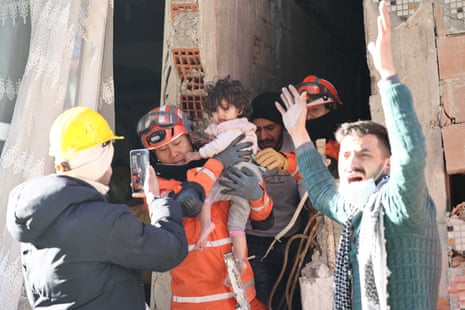
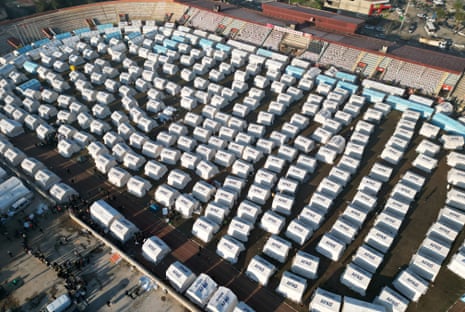
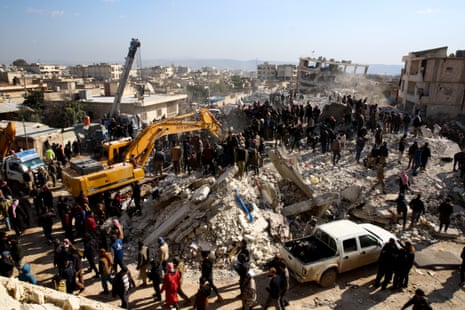
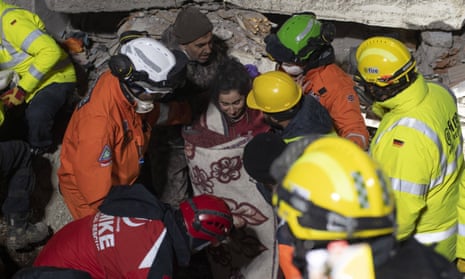
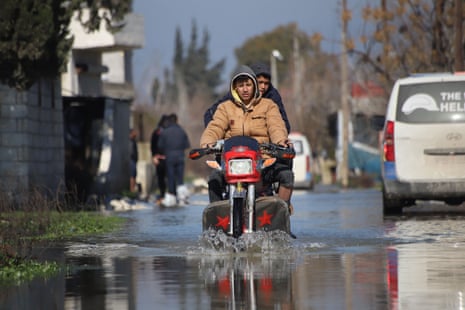
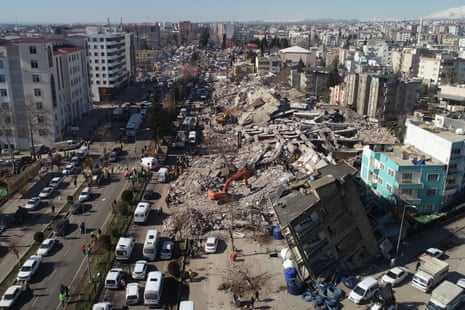
The death toll in Turkey from Monday’s earthquakes has risen to 14,014, the Turkish president, Recep Tayyip Erdoğan, has said, with more than 63,000 people injured.
Visiting the quake-hit province of Gaziantep, Erdoğan said more than 6,400 buildings had been destroyed and that Turkey aimed to build new three and four-storey buildings in the region within one year, Reuters reports.
A total of at least 3,162 are confirmed dead in Syria, with government-held areas reporting 1,262 people dead and 1,900 killed in the rebel-controlled northwest, meaning the combined tally in both countries now stands at 17, 176.
Experts have said that it is likely to continue to rise.
The World Health Organization (WHO) has underlined the importance for humanitarian organisations of making sure that people who have survived the quake “continue to survive”.
The WHO’s incident response manager, Robert Holden, told reporters in Geneva many were surviving “out in the open, in worsening and horrific conditions” with severely disrupted water, fuel and electricity supplies:
We are in real danger of seeing a secondary disaster which may cause harm to more people than the initial disaster if we don’t move with the same pace and intensity as we are doing on the search and rescue side. People need the basic elements to survive the next period.
British rescue crews are still finding live victims in “survivable voids” created by the way buildings have collapsed, the head of the UK International Search and Rescue team in Turkey, David O’Neill, has said:
We are still finding live victims. It is surprising, but it’s encouraging the way these buildings have collapsed. The people that were recovered yesterday were very dehydrated, slightly hypothermic because of the extremely cold conditions here. They’re still alive.
O’Neill told Sky News that the fcat that that people were in bed and wrapped in blankets at the time of the first earthquake on Monday has increased their chances of surviving.
First aid convoy reaches SyriaAn aid convoy has reached northwestern Syria, the first since Monday’s devastating earthquake that has killed nearly more than 1,000 people in the the rebel-held area, an official at the Bab al-Hawa border crossing has told Agence France-Presse.
An AFP correspondent reported seeing six trucks passing through the crossing from Turkey carrying tents and hygiene products. The border official, Mazen Alloush, said the delivery had been expected before Monday’s quake.
The UN had earlier said it had received assurances that the first aid would reach northwestern Syria through the sole authorised crossing from Turkey on Thursday.
The window to save victims of the earthquake in Turkey and Syria is “fast running out”, the World Health Organisation’s regional director for Europe has said.
Dr Hans Kluge told BBC Radio 4’s Today programme that only 22% of people trapped in rubble survive for 72 hours after an earthquake, and the percentage falls rapidly from then on.
“Every minute counts now because the window to save lives is fast running out,” Kluge said. “Everyone is working flat out to find and rescue any survivors.” The death toll is likely to “go much higher”, he said.
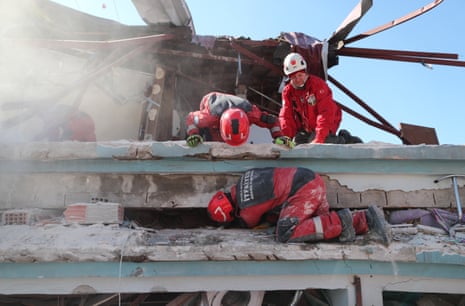
Relief efforts in Turkey and Syria are being hampered by a “raft of issues”, a former British Army logistics expert has said.
Retired Major General Sir Tim Cross told Sky News: “The sadness of the slow response… You need people on the ground allocating resources, understanding what is needed. You need to clear the roads to get in and out of these areas.
“You need support helicopters to get people away from the danger area and further danger. So there is a whole raft of issues that are going on here.”
He added: “You’ve got the people who are buried but you also have the survivors. Those survivors need to be given shelter, water, food, sanitation, medical support, power – all of those issues that are essentially logistics issues.”
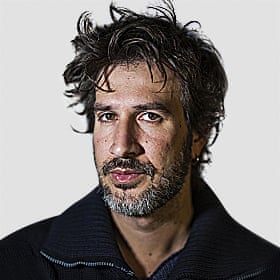
Lorenzo Tondo
The Guardian’s Lorenzo Tondo is in southern Turkey with photographer Alessio Mamo:
Yesterday we visited the towns of Pazarcik, the epicentre of the earthquake, and Kahramanmaraş, where hundreds of rescuers continue to work tirelessly in the hope of still finding more survivors.
We could smell corpses as they dug through piles of debris in the centre of the town. Emergency workers there continued to comb the wreckage, often finding only body parts. In front of the buildings, razed to the ground, people offer condolences to the families of the victims, who are sitting in the street around fires.
Their loved ones are still wedged somewhere under the remaining debris. After three days, hopes of finding them alive are fading away.
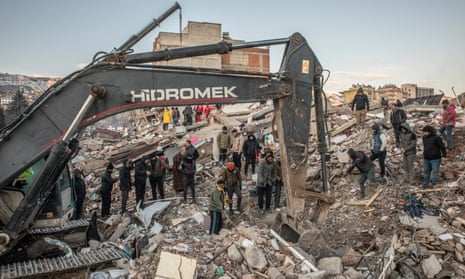
You can read Lorenzo’s full report here.











































![SILVERBACK SERVER VS ORANGUTAN OOGA BOOGA 🍔🥊 [I GUESS HE COULDN'T HAVE IT HIS WAY]](https://bfn.today/@btc/live/cover_images/d576WL2AwSIp/yq6FOFGqx815_640x360.jpg.webp)








